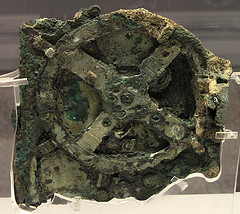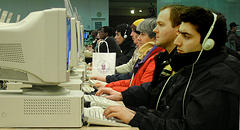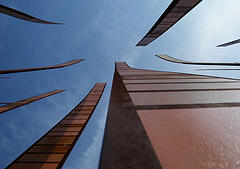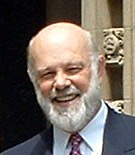July 31st, 2008 by Eugene Barsky | No Comments »

The New York Times has an article today about an ancient Greek technology known as the Antikythera Mechanism
A very interesting read indeed – Discovering How Greeks Computed in 100 B.C.
The NYT article cites a letter published in Nature today –
Freeth, T; Alexander, J, Steele, JM, Bitsakis, Y (July 31, 2008). “Calendars with Olympiad display and eclipse prediction on the Antikythera Mechanism“. Nature 454: 614–617.
** Photo from – http://www.flickr.com/photos/ethanhein/
Posted in Amusing stuff, General Science, Main, Mathematics, News, Science - undegraduate classes, Statistics | No Comments »
July 25th, 2008 by Kevin Lindstrom | No Comments »
As part of the UBC Library’s mandate to archive undergraduate research, three EOSC honors theses have just been added to the Earth and Ocean Sciences Community in cIRcle – UBC’s Information Repository.
Bayliss, Sandra M. 2008. Uranium-Lead, Argon-Argon, and Lead Isotopic Constraints of Magmatism and Associated Mineralization within the Stikine Terrane, on the Williams Gold Property, North Central British Columbia. Undergraduate Honours Thesis. Department of Earth and Ocean Sciences. University of British Columbia.
Kushnir, Alexandra R.L. 2008. Understanding Multi-Peak Anomalies for Unexploded Ordnance Discrimination. Undergraduate Honours Thesis. Department of Earth and Ocean Sciences. University of British Columbia.
Cleven, Nathan R. 2008. Role of Dolomite Content on the Mechanical Strength and Failure Mechanisms in Dolomite-Limestone Composites. Undergraduate Honours Thesis. Department of Earth and Ocean Sciences. University of British Columbia.
If you are interested in contributing your undergraduate thesis to cIRcle, please contact me directly kevin.lindstrom@ubc.ca
Posted in Earth and Ocean Sciences, General Science, Main, News, Science - undegraduate classes | No Comments »
July 25th, 2008 by Kevin Lindstrom | No Comments »
The 6th International Conference on Gas Hydrates (ICGH) is an international conference that takes place every three years. This year’s conference took place in Vancouver from July 6-20.
Select conference papers presented at ICGH 2008 are now available online at cIRcle, the UBC Library’s Information Repository. This collection continues to grow as authors contact me about adding their papers to the ICGH 2008 archive.
Dr. Peter Englezos from the Department of Chemical and Biological Engineering is a member of the International Scientific Committee for the 6th International Conference on Gas Hydrates.
Participating organizations includes
China University of Geosciences
Chinese Academy of Sciences
Colorado School of Mines
Geological Survey of Canada
Korea Advanced Institute of Science and Technology
National Institute of Advanced Industrial Science and Technology of Japan
National Research Council of Canada
Technical University Berlin
United States Department of Energy
United States Geological Survey
University of British Columbia
University of Toronto
as well as a host of other universities, institutes, organizations, and companies.
If you have presented a conference paper at the ICGH 2008 conference and would like it uploaded to cIRcle, please contact kevin.lindstrom@ubc.ca directly.
Posted in Chemical and Biological Engineering, Chemistry, Earth and Ocean Sciences, General Science, Main, News | No Comments »
July 25th, 2008 by Eugene Barsky | No Comments »
Randy Pausch, the computer scientist from Carnegie Mellon Univ, whose “The Last Lecture” speech on September 18, 2007 at Carnegie Mellon University inspired so many (including yours truly) had died yesterday night.
Watch Pausch’s last lecture on youtube – https://www.youtube.com/watch?v=ji5_MqicxSo
From Carnegie Mellon Univ press release:
Celebrated in his field for co-founding the pioneering Entertainment
Technology Center and for creating the innovative educational software
tool known as “Alice,” Pausch earned his greatest worldwide fame for his
inspirational “Last Lecture.”
That life-affirming lecture, a call to his students and colleagues to go
on without him and do great things, was delivered at Carnegie Mellon on
Sept. 18, 2007, a few weeks after Pausch learned he had just months to
live. Titled “Really Achieving Your Childhood Dreams,” the humorous and
heartfelt talk was videotaped, and unexpectedly spread around the world
via the Internet. Tens of millions of people have since viewed video
footage of it.
Pausch, who had regularly won awards in the field of computer science,
spent the final months of his life being lauded in arenas far beyond his
specialty. ABC News declared him one of its three “Persons of the Year”
for 2007. TIME magazine named him to its list of the 100 most
influential people in the world. On thousands of Web sites, people wrote
essays about what they had learned from him. His book based on the
lecture became a #1 bestseller internationally, translated into 30
languages.
Posted in Main, News, Science - undegraduate classes | No Comments »
July 21st, 2008 by Eugene Barsky | No Comments »

The 2007 Canadian Internet Use Survey was released on June 12th.
Interesting findings include:
“Almost three-quarters (73%), or 19.2 million Canadians aged 16 and older, went online for personal reasons during the 12 months prior to the survey. This was up from just over two-thirds (68%) in 2005 when the survey was last conducted. For the first time, the survey covered young people aged 16 and 17. They accounted for almost one of the five percentage point increase in Internet use between 2005 and 2007.”
“Among people who used the Internet at home, 68% went online every day during a typical month and 50% for five hours or more during a typical week. On average, men were online more often and for longer periods than women.”
“High-speed connections are becoming far more prevalent. An estimated 88% of people who accessed the Internet at home did so with a high-speed connection in 2007, up from 80% two years earlier. This growth was driven by new users and by existing users switching from a slower service.
Over 9 in 10 urban home users reported using a high-speed connection, compared with just over 7 in 10 home users in rural areas. More than one-half of rural and small town residents using a slower service reported that a high-speed telephone or cable service was not available in their area.”
More Canadians are participating in blogging, chatting and downloading. Internet use rates are highest in British Columbia, Alberta and Ontario.
Found via Stephen’s Lighthouse
** Photo by striatic
Posted in General Science, Main, Mathematics, News, Science - undegraduate classes, Statistics | No Comments »
July 18th, 2008 by Kevin Lindstrom | No Comments »
The Council of Canadian Academies was asked by the federal Minister of Natural Resources to assess the challenges for an acceptable operational extraction of gas hydrates in Canada in terms of: economic impact, social acceptability, and accessibility? As a result, the Expert Panel on Gas Hydrates was appointed by the Council to address the question and provide an account of the science and technology relevant to the safe extraction and use of gas hydrates in Canada.
The expert panel, chaired by John Grace (FRSC, FCAE), held its first meeting on May 8 and 9, 2007 to discuss the question with the sponsoring department (Natural Resources Canada); to agree on an outline for the assessment report; and to coordinate research and writing tasks. The question addressed by the panel is as follows: “What are the challenges for an acceptable operational extraction of gas hydrates in Canada in terms of: economic impact, social acceptability, and accessibility?”
UBC Members of the Expert Panel include
John Grace, Chair
Professor, Chemical and Biological Engineering and Canada Research Chair in Clean Energy Processes, University of British Columbia (Vancouver, BC)
Peter Englezos
Professor, Department of Chemical and Biological Engineering, University of British Columbia (Vancouver, BC)
The Report in Focus is now available with the Full Report to be released in August 2008 from the Council of Canadian Academies website.
Posted in Chemical and Biological Engineering, Chemistry, Earth and Ocean Sciences, General Science, News, Science - undegraduate classes | No Comments »
July 15th, 2008 by Kevin Lindstrom | 1 Comment »
Dr. Tom Pedersen has co-authored an interesting editorial published in the journal Marine Pollution Bulletin looking at natural sewage treatment as it relates to the city of Victoria’s current policy of discharging screened sewage into the ocean environment.
“Despite scientific evidence that there are no major environmental or human health impacts, this discharge of ‘untreated’ sewage has been a constant irritation to the city’s US neighbours and to environmental groups, has resulted in a large number of lay opinions in the popular media (radio, television, newspapers, magazines), and finally resulted (July 2006) in the British Columbia Minister of the Environment directing the CRD to move to secondary sewage treatment.”
For more on this topic, have a look at Peter Chapman’s editorial Science, politics and ideology – The Victoria (BC, Canada) sewage issue.
Dr. Tom Pederson is a professor in UBC’s Department of Earth and Ocean Sciences.
Posted in Chemical and Biological Engineering, Civil Engineering, Earth and Ocean Sciences, General Science, Main, News | 1 Comment »
July 14th, 2008 by Eugene Barsky | No Comments »
Here is the handout we are going to use for our “Mastering Google for Science and Engineering” workshops this week on July 16 and July 17, 2008
Here is the PDF copy. You can also see the embedded copy below. Please let us know if you have any questions!
Posted in Main, Teaching | No Comments »
July 11th, 2008 by Eugene Barsky | No Comments »

On 4 July 2008 Science had an editorial about peer-review process.
http://www.sciencemag.org/cgi/content/full/321/5885/15
Written by the Science editors, including Bruce Alberts – the Editor-in-Chief, it is indeed an interesting read! Have a look..
** Photo by selva
Posted in Chemical and Biological Engineering, Chemistry, Civil Engineering, Earth and Ocean Sciences, General Science, Main, Mathematics, Mechanical Engineering, Physics, Science - undegraduate classes, Statistics, Wood Sciences | No Comments »
July 9th, 2008 by Eugene Barsky | No Comments »

Geography Professor Emeritus Timothy R. Oke is appointed to Order of Canada.
He is recognised for his research in meteorology and urban climatology, and his mentoring of generations of geographers.
http://www.publicaffairs.ubc.ca/ubcreports/extras/2008/08jul02.html
**Photo from this page: http://www.geog.ubc.ca/~toke/
Posted in Earth and Ocean Sciences, Main | No Comments »




